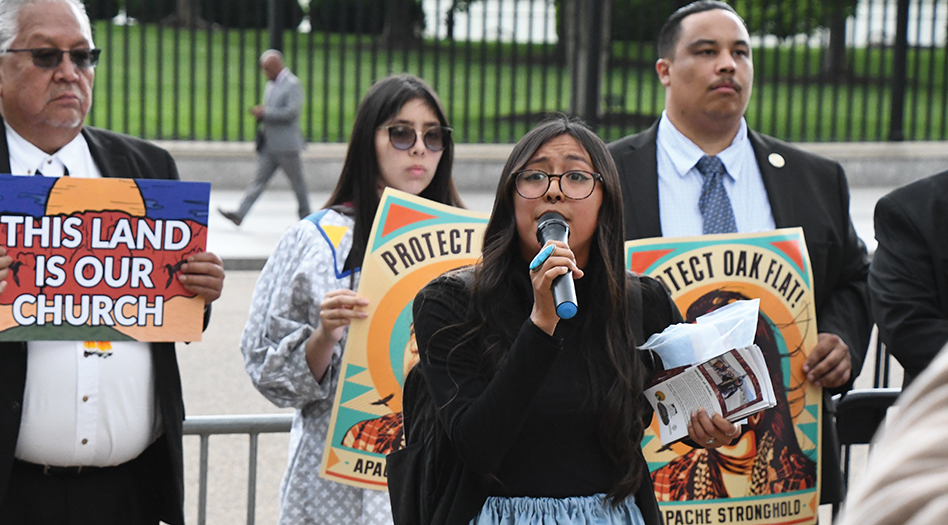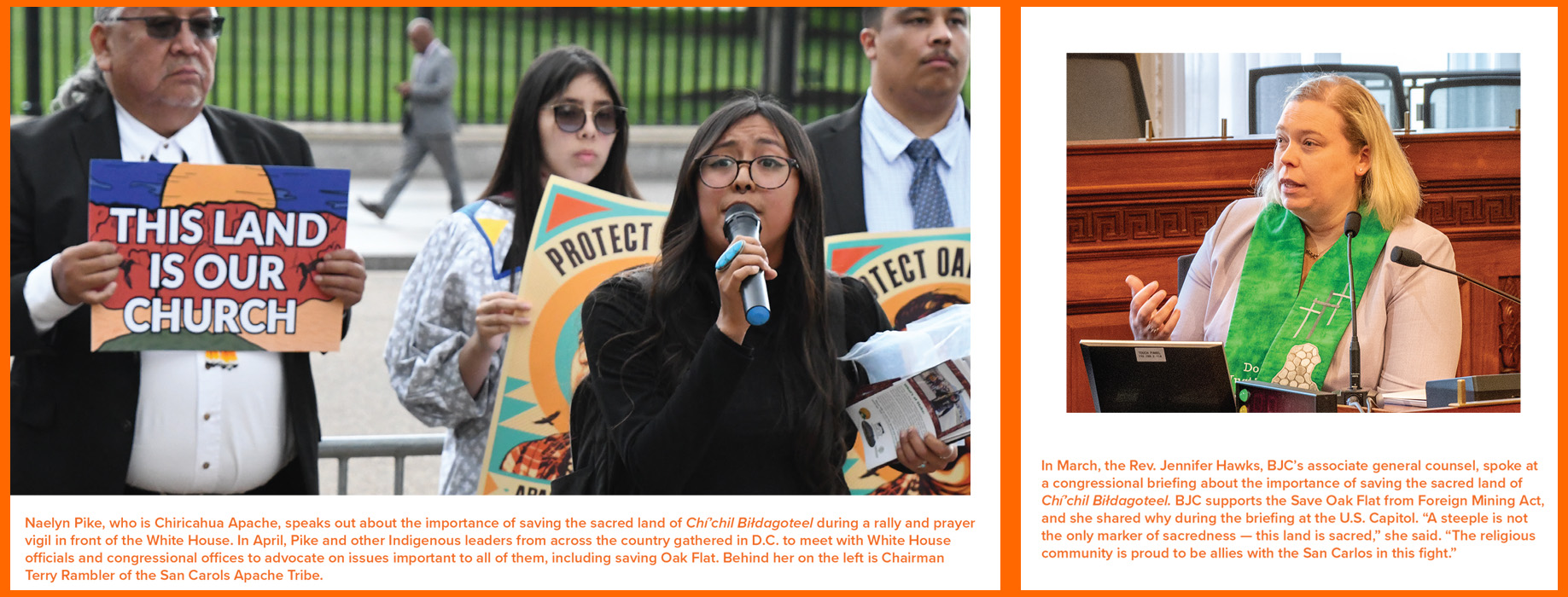What’s new in the work to save Oak Flat?
Sacred ground isn’t always marked by a steeple.

What if your elected officials told you that your sacred place mattered less than that of a different congregation nearby? That’s the issue facing the San Carlos Apache Tribe in their struggle to save their sacred land of Chí’chil Biłdagoteel — loosely translated in English as “Oak Flat.”
For the past few years, BJC has been a leader in the work to protect this land, bringing together more than 100 religious and religious freedom organizations to support the religious freedom of our Indigenous neighbors. The issue is ongoing, and we asked the Rev. Jennifer Hawks, BJC’s associate general counsel, to give us an update on this important work.
Why is protecting this land important to BJC?
BJC works to defend faith freedom for all, and that includes our Indigenous neighbors. We joined this advocacy effort because the San Carlos Apache Tribe wanted allies to remind Congress, the administration and everyone else that Chí’chil Biłdagoteel is their church. Sacred ground isn’t always marked by a steeple.
What have we seen from the White House and Congress over the past few years?
One of the last acts of the U.S. Department of Agriculture under President Trump was the premature release of the report that triggers the transfer of Oak Flat to the mining company within 60 days. Before the 60 days were up, the USDA under the Biden administration repealed the report, finding it incomplete and acknowledging a need to engage in meaningful consultation with the San Carlos Apache and other local Tribes. Rep. Raúl Grijalva, D-Ariz., reintroduced the Save Oak Flat Act in March 2021 and held a hearing on the bill the following month. Despite receiving a record number of cosponsors, the bill never was scheduled for a vote on the House floor.
Is this current Congress poised to take action on this issue?
Rep. Grijalva revised the bill from last Congress and introduced the Save Oak Flat from Foreign Mining Act (H.R. 1351) in March of this year. The bill text includes a section of congressional findings about how China will profit off this land transfer and other reasons to oppose it. The bill has already picked up several cosponsors, though none are Republicans at this time. With a divided Congress, this bill will have to garner bipartisan support in order to pass. Historically, the bill receives bipartisan support, so I’m optimistic.
What’s been happening on this issue since the new bill was introduced?
In late March, the Biden administration appeared poised to transfer Oak Flat to Resolution Copper, a foreign-owned mining company. The USDA indicated it was resuming the process to complete the land transfer, while the Department of Justice told the 9th U.S. Circuit Court of Appeals during an oral argument that the report that triggers the land transfer would be released in late spring or early summer. Clearly, some within the Biden administration are interested in completing this deal. Our diverse coalition jumped into action, reaching out directly to White House officials and asking advocates to amplify our messages over social media. And it worked — at least for now. The White House responded that no decision was imminent. In late May, the DOJ notified the 9th Circuit that the transfer of Oak Flat is still under review and that it does not know when this review will be completed. This is an important victory that gives us a small window to redouble our congressional outreach. Ultimately, Congress is the branch of government that can permanently save Oak Flat.
What is unique about this work compared to other work you do at BJC?
Oak Flat advocacy is more tactile than many of the religious freedom issues we work on. It is a religious freedom issue that can literally engage all five senses. Visits to Oak Flat often spark an increased commitment to save the sacred land.

What sort of impact is BJC making on this issue?
While advocacy to save Oak Flat has been ongoing for more than 20 years, the religious freedom community was not leading any advocacy efforts until 2021 when the San Carlos Apache Tribe asked BJC to get involved. Many congressional staffers and White House officials do not expect to hear religious freedom arguments in an issue dominated by environmental concerns. Because of this, outreach from BJC and other religious freedom advocates sometimes gets a quicker response than other coalition partners.
Thus far, we have recruited more than 100 religious and religious freedom organizations to support the San Carlos and other Indigenous communities who hold Oak Flat as sacred. We have created resources for individuals and partner organizations to use. Thanks to the advocacy of our BJC staff and members of the BJC community, we recruited several new cosponsors to the bill in the previous Congress.
What is one of the biggest obstacles in the effort to save Oak Flat?
There is an aggressive misinformation campaign by the mining company that wants to obtain this land, and we spend a lot of time countering their lies and half-truths. Here’s what we often have to remind people when we meet about this issue:
- The San Carlos Apache Tribe is not the only tribal government opposing the mine. An overwhelming number of tribes in Arizona and across the country oppose the mine. Also, the Inter Tribal Association of Arizona (ITAA), the National Congress of American Indians, and other inter-tribal organizations passed resolutions condemning the mine.
- The copper extracted from under Oak Flat will not remain in the United States. Copper is already Arizona’s top export, and the smelters in the U.S. that refine the ore into usable copper are at capacity (and thus not able to handle an influx of new copper from Oak Flat). More than 25% of the copper mined in the U.S. last year was exported overseas.
- The mining company does not get to define sacred land for Indigenous people. Oak Flat is sacred no matter how many times the mining company tries to argue that they should just pray and perform ceremonies somewhere else.
- The sacred and outdoor uses of Oak Flat cannot continue when the mining company owns the land. Within a few years, the surface will become unstable and collapse into a massive crater, estimated at 1.8 miles across and 1,100 feet deep.
What can we do to make an impact?
Ask your congressional representative to cosponsor the Save Oak Flat from Foreign Mining Act (H.R. 1351). If your member of Congress is already a cosponsor, ask your representative to do one — or all — of the following three things: Solicit support from colleagues; give a 1-minute floor speech on the importance of saving Oak Flat; and/or request a committee hearing on the bill.
And, please share your personal support for saving Oak Flat on social media — you can see ideas and examples on our website by visiting BJConline.org/saveoakflat.
The Rev. Jennifer Hawks is associate general counsel at BJC.
This article first appeared in the summer 2023 edition of Report from the Capital. You can download it as a PDF or read a digital flip-through edition.




